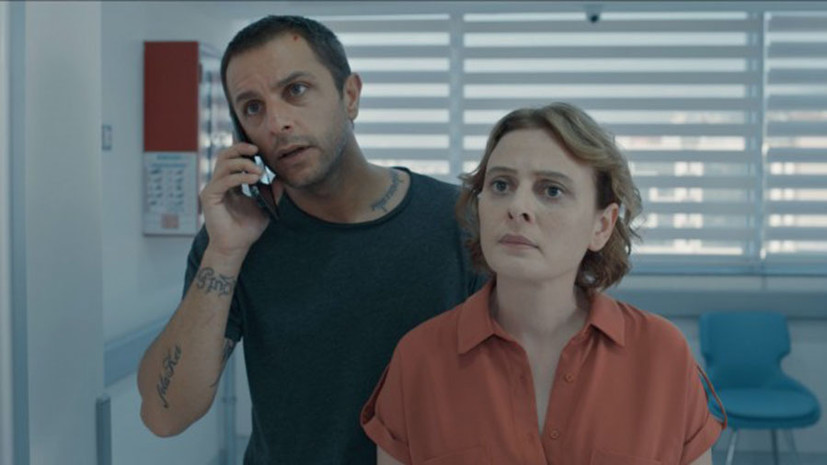As part of the main competition of the 44th MIFF, a film jointly produced by Turkey, Germany and Slovenia "Nadezhda" was shown.
This is the second full-length feature film directed by Umit Kyoreken.
Previously, he directed the film Blue Bicycle, which was screened at the Berlin Film Festival.
The central roles in "Hope" were played by Baran Shukru Babacan, Eylem Yildiz, Funda Eskiolu and others.
In the center of the plot is the 35-year-old actor Umut, who longs to achieve more in his career.
He is preparing to audition for a movie role.
Asie, his wife, believes in her husband and believes that he has the potential to become a star.
She is a determined, kind and bright woman, the head and director of a private theater, where Umut also serves.
In her interpretation of The Seagull, Asie entrusted her husband with the role of Treplev.
The calm and measured life of the hero ends when he learns about the arrival in the city of his sick mother, whom Umut has not seen for 20 years - he was brought up by his uncle after his mother married a second time.
Umut does not want to know anything about her, but circumstances force him to look after the woman while she undergoes a medical examination.
Like snow on his head, the second news falls on him - Asiya is pregnant.
Childhood trauma and resentment against his mother do not allow Umut to respond correctly to the news of the offspring: he once witnessed a conversation with his mother, who regretted the birth of Umut.
The tape touches on the eternal problem of fathers and children, in this case, a cold, aloof mother and an adult boy who is always looking for love and affection.
Umut finds love and care in the face of Asiya, but even with her he cannot get rid of the feeling of loneliness and longing that have haunted him since childhood.
The director shows that this feeling is deeply seated in a person who did not receive love and warmth at an early age.
Shot from the film "Hope"
Umut's psychological traumas, no matter how he tries to escape from them, overtake him at a physically mature age.
By that moment, he was not emotionally formed as a man: a boy still lives in him, who does not know how to make decisions and expects to be noticed in the same way that Asie once noticed.
However, colleagues see him as a mediocre actor and believe that even the director's wife failed to make him an intelligent professional.
The director uses various symbols as an element of allegorical expressiveness for a deeper reflection of the interpersonal relationships of the characters: a door, a mirror, blood, shoes, hands, and others.
For example, when Umut and Asie bring their mother to their house for the first time, she takes off her shoes not in the hallway of the apartment, but on the landing in front of the front door.
Asia sees this but closes the door.
When Umut comes home with his mother, he brings her shoes into the house and puts them in the closet, which indicates the hero’s desire to let his mother into his life again.
Another important symbol of the tape is Umut's bloodied face as a result of a fight - it is broken on the left side, while the right profile was not damaged at all.
Pushing the hero to make a choice in his life - the past in the face of his mother and the future in the face of Asia and their child, the director gradually brings the viewer to an open ending.
Allowing the viewer to decide what choice Umut came to, the cinematographer at the same time hints that, having overcome his internal traumas, a person can still improve his life and reach heights in the profession.
In general, "Hope" is a psychological drama of an ordinary person who has just embarked on the path of self-knowledge.
The director of the tape admitted that for four to five years he has been exploring the psychology of the relationship between mother and child.
In his tape, he reflected the theme of the impact of the lack of maternal love in the lives of children, especially boys, on their future fate.
Even being loved by other people, they doubt that they are worthy of love, that someone is capable of loving them sincerely.
In addition, the lack of tender feelings at an early age has a devastating effect on each subsequent choice of a person until he undergoes therapy.
At a press conference for the film, Kaureken said that from his youth he has been an admirer of the work of Russian classics.
In the picture itself, he also quotes Turgenev.
Inspired by the play "The Seagull" by Anton Chekhov at the age of 13, the cinematographer finally realized his dream of making a film based on it.
Moreover, he would like to work on a theatrical production.
Turkish cinema at the MIFF in different years was presented in various competitive programs and was awarded the main prizes more than once.
So, in 2013, Erdem Tepegoz's film "Particle" (Zerre) became the best film of the main competition, and Jale Arykan, who played the main role in the film, was awarded the silver "Saint George".
The director's film In the Shadows received a special jury prize at the 42nd MIFF.
In 2019, as part of the Cross Year of Culture and Tourism of Russia and Turkey, famous films were shown that participated and won in the largest festivals in the world.
Within the framework of the “Roads of Turkish Cinema” program, the films “Wild Pear” (Ahlat Agaci) by Nuri Bilge Ceylan, “Dove” (Güvercin) by Banu Syvaci, “Statement” (Anons) by Mahmut Fazyl Coskun and others were presented.

